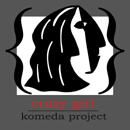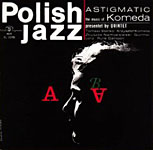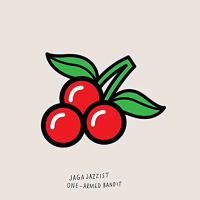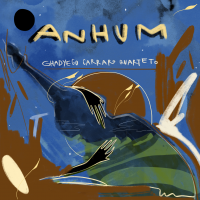Home » Jazz Articles » Interview » Komeda Project: Bringing New Life to a Legend
Komeda Project: Bringing New Life to a Legend
 From left: Andrzej Winnicki, Krzysztof Medyna, Russ Johnson
From left: Andrzej Winnicki, Krzysztof Medyna, Russ Johnson Komeda Project has released two acclaimed albums—Crazy Girl (WM Records, 2007) and Requiem (WM Records, 2009). Both albums mix classic Komeda compositions with one or two of Winnicki's tunes, which are strong compositions in their own right. During a telephone interview, Winnicki and Medyna spoke with great affection and enthusiasm about Komeda's work and also about their own development as musicians in their native Poland and, since the early '80s, in the United States.
Winnicki and Medyna first discussed their own lives as jazz musicians. Medyna decided to start, "Because I am older," he said, laughing. "Yes," interrupted Winnicki, "he goes back longer." They both laughed, as they did regularly throughout the interview, before Medyna continued. "I was born into a musical family on my mother's side. My grandfather was a conductor, and my mother was a skilled pianist. She never played professionally, but she would play and sing at home. They started my musical education when I was 5 years old, but they had no real knowledge of jazz, so my first years were terrible [he laughed again] because I had to play music I didn't like. Then when I was 12, I saw on Polish television a program with music I had never heard before—it was Dixieland, performed by a Polish band called the New Orleans Stompers. I thought that they couldn't be Polish because the band's name was American, but a few weeks later the Polish Politburo asked them to change their name to the Warsaw Stompers." Medyna laughed loudly at this example of political thinking. "This is a funny story, but since then I have been in love with jazz," he said.
Medyna's love for the music led him to try and play it whenever he could, but it was not easy. "Records were not available in Communist Poland, and all of my generation would listen to Voice of America, to Willis Conover's Jazz Hour, which was famous across the Communist Bloc. I went to college to study as a music teacher—I didn't teach for long, for about two years before I became a professional musician—then I went to Sweden for a few years to make some real money and buy a real instrument. When I came back to Poland [in the late 1970s], I was approached by Andrzej, who is a younger guy, and he asked me if I would like to start a jazz project."
Medyna saw Komeda play in Poland before the composer left for the United States in the mid '60s. "From the age of 16, I would go every year to Warsaw, to the Jazz Jamboree, which was the biggest jazz festival in the Soviet Bloc," Medyna said. "So I had the chance to hear the Komeda Quintet before he left for America."
 Winnicki's musical development took place in an environment that was opening out from the constraints that Medyna experienced. He can no longer recall how old he was when he first heard jazz, but the memory is otherwise vivid. "At that time, there was a magazine called Ameryka, published in Polish, by the American State Department, I think. It's strange to think that it was published in Poland, but it was a very glossy magazine and so popular that you had to have connections with the places where it was sold to have a chance of getting one. My father would buy it, and it would often come with a flexi-disc [a cheap, flexible, vinyl record with music on only one side]. The first jazz I ever heard, and it had a great effect on me, was Miles Davis' recording of 'My Funny Valentine' on one of these discs. It was so glorious; I just fell in love. I think I might have been very young at the time—I definitely wasn't yet 10 years old."
Winnicki's musical development took place in an environment that was opening out from the constraints that Medyna experienced. He can no longer recall how old he was when he first heard jazz, but the memory is otherwise vivid. "At that time, there was a magazine called Ameryka, published in Polish, by the American State Department, I think. It's strange to think that it was published in Poland, but it was a very glossy magazine and so popular that you had to have connections with the places where it was sold to have a chance of getting one. My father would buy it, and it would often come with a flexi-disc [a cheap, flexible, vinyl record with music on only one side]. The first jazz I ever heard, and it had a great effect on me, was Miles Davis' recording of 'My Funny Valentine' on one of these discs. It was so glorious; I just fell in love. I think I might have been very young at the time—I definitely wasn't yet 10 years old." Winnicki began learning how to play an instrument at around the same time. "I started on accordion and switched to piano quite late, when I was 13 or 14," he said. After studying piano formally, he began to play in various jazz groups. With one group, he played at Jazz On the Odra River, Poland's biggest jazz competition, where Medyna had already been a prize winner some years prior. When Medyna returned from Sweden, Winnicki was already aware of the saxophonist. "I asked him if he wanted to do something new, and that's how Breakwater was formed," Winnicki said.
Winnicki began learning how to play an instrument at around the same time. "I started on accordion and switched to piano quite late, when I was 13 or 14," he said. After studying piano formally, he began to play in various jazz groups. With one group, he played at Jazz On the Odra River, Poland's biggest jazz competition, where Medyna had already been a prize winner some years prior. When Medyna returned from Sweden, Winnicki was already aware of the saxophonist. "I asked him if he wanted to do something new, and that's how Breakwater was formed," Winnicki said.
Breakwater soon became established on the Polish scene, and Winnicki and Medyna entered the band in the Jazz On the Odra River competition. "We won in 1979 as the best group in the country, and Krys won as best instrumentalist, so we won two top prizes in that year," Winnicki said. Breakwater was a professional outfit, enabling the musicians to make a living out of playing jazz—at least to some extent. "Well, yes and no. It wasn't much of a living," continued Winnicki, laughing, "but at least we got to play and to travel abroad—not outside the Soviet Bloc, but to East Germany, Czechoslovakia and the Soviet Union."
The chance to make a better living arose through contact with a pop singer. "On the side, we hooked up with a very popular singer, and we used to back him," Winnicki said. Who was this? "Ehm ... I forget," he said. Medyna explained a little more, but also declined to name the artist: "I'm making a bit of a joke here—he was the Polish Frank Sinatra. He was the Number One in Poland when Frank was Number One in the states."
In the early '80s, Medyna also played in In/Formation, a band led by pianist Slawomir Kulpowicz and composed of past winners of the Jazz On the Odra River competition. "Yes, that was around 1981," Medyna said. "It was a pretty interesting lineup. The rhythm section was standard for modern jazz—drums, upright bass and piano—but the front line was two tenor saxophones and a tuba. We played constantly for over a year, and then at one point we were part of a setup where Tomasz Stańko would play a solo first set, then In/Formation would play the second set." The band's drummer was Czeslaw Bartkowski, who, like Stanko, had played with Komeda.
In 1981 Medyna and Winnicki decided to move to the United States, but the move did not go according to plan. "We went as part of the pop singer's band," Winnicki said. "We should have traveled on 16th December 1981, but on December 13th, our generals decided to declare martial law, and we had to stay at home. ... We finally made it to the States in January 1982. Medyna added, jokingly, "It was January 21st [two days and 28 years before this interview took place]. It's our anniversary, Andrzej. Happy Anniversary." Since their arrival in the United States, the two friends have worked as professional musicians, although at times other jobs have been necessary, as Medyna explained: "I have done other things, as well, to support my family, but I have always played music, without a break—dance music, concerts, whatever I can play." Winnicki also began his time in America by mixing music and other work. "Although I had taken English in college, my speaking ability wasn't that great, and it took me a while to 'find my feet,' as they say. But I began to play full time in the late '80s," he said. "At that time, there was a huge scene in the Atlantic City casinos, which isn't there anymore—when they used to have bands playing almost 24-7 with some really great players. It was really an amazing scene. I did that for a while, then later when my first son was born, I moved back to New York and hooked up with an agency. I do a lot of work playing places like the Plaza and Waldorf and other hotels."
Since their arrival in the United States, the two friends have worked as professional musicians, although at times other jobs have been necessary, as Medyna explained: "I have done other things, as well, to support my family, but I have always played music, without a break—dance music, concerts, whatever I can play." Winnicki also began his time in America by mixing music and other work. "Although I had taken English in college, my speaking ability wasn't that great, and it took me a while to 'find my feet,' as they say. But I began to play full time in the late '80s," he said. "At that time, there was a huge scene in the Atlantic City casinos, which isn't there anymore—when they used to have bands playing almost 24-7 with some really great players. It was really an amazing scene. I did that for a while, then later when my first son was born, I moved back to New York and hooked up with an agency. I do a lot of work playing places like the Plaza and Waldorf and other hotels." While Medyna and Winnicki both have active professional lives, the Komeda Project is clearly very close to their hearts, and their love of Komeda's music is obvious. Does Komeda still hold a place of importance in his native Poland? "I think he is very special to all of us in the old country," Winnicki said. "He was the first Polish musician to approach this music differently. Other Polish musicians were following or imitating, but Komeda, as primarily a composer of movie soundtracks, approached jazz from a different point. His compositions are musical illustrations, and in my opinion, they are therefore always fresh. You can approach these compositions any way you wish, and they will always be up to date. This makes Komeda very special for us and for the musical world generally. And I think the fact that he died, unfortunately very young, contributes to his status as a hero." Medyna interjects: "To the legend, like Monroe. ... By the time I got in touch with Komeda and his music,he was already a kind of legend in Poland; he was already gone. It took me a while to understand this music, specifically Astigmatic. When I first heard that record, I didn't understand what he was doing—I was only about 15 or so. It was over my head. It's not like it was a revelation for me from the get go; it took me a while to really get it."
While Medyna and Winnicki both have active professional lives, the Komeda Project is clearly very close to their hearts, and their love of Komeda's music is obvious. Does Komeda still hold a place of importance in his native Poland? "I think he is very special to all of us in the old country," Winnicki said. "He was the first Polish musician to approach this music differently. Other Polish musicians were following or imitating, but Komeda, as primarily a composer of movie soundtracks, approached jazz from a different point. His compositions are musical illustrations, and in my opinion, they are therefore always fresh. You can approach these compositions any way you wish, and they will always be up to date. This makes Komeda very special for us and for the musical world generally. And I think the fact that he died, unfortunately very young, contributes to his status as a hero." Medyna interjects: "To the legend, like Monroe. ... By the time I got in touch with Komeda and his music,he was already a kind of legend in Poland; he was already gone. It took me a while to understand this music, specifically Astigmatic. When I first heard that record, I didn't understand what he was doing—I was only about 15 or so. It was over my head. It's not like it was a revelation for me from the get go; it took me a while to really get it."
When Medyna finally did "get it," it was through a process of rediscovery. "At 15 years of age, I put it on the back burner and just moved on. Later on, when jazz fusion was the big thing in Poland, Komeda was still a legend—you had to hear his music no matter what. Even if you didn't understand the music, you were afraid to admit it," Medyna said. "So at that point, I rediscovered it, and this was a sort of an epiphany for me."
In the USA and Europe, Komeda was best known for his film soundtracks, written for movies such as Rosemary's Baby (1968) or The Fearless Vampire Killers (1967), both of which were directed by Roman Polanski. In Poland, Komeda's soundtrack work had started some years earlier, as Winnicki pointed out. "He scored something like 40 movies for Polish directors. He is right up there as a composer of film scores, capturing the mood of a movie."
Komeda died in 1969. Almost 40 years later, Medyna and Winnicki formed the Komeda Project. The group's genesis goes back earlier than this, to the re-activation of Breakwater in 2000 as Electric Breakwater and its subsequent release of In the Bush (J-Bird Records, 2000). Medyna put this work into context: "We were playing in the late '90s around New York City and New Jersey. We played pretty often on the fusion scene, but we were witnessing the sad period when fusion died a natural death. One day, we arrived at the Zanzibar Club in Manhattan to play a gig, and we saw the closed door and yellow police tape. Andrzej called the owner, and he said, 'Oh, I sold the club—it's going to be a Chicago blues place.' So we realized that it made no sense to continue to play fusion, and we started to go acoustic and play Komeda material. At first we were still called Electric Breakwater, but we started to play with an upright bass—it was an evolution, not a revolution."
The first lineup under the Komeda Project name arrived in 2004; Crazy Girl was released three years later. The album featured trumpeter Russ Johnson. "We searched for the right trumpet player for a while," Winnicki said. "It was the hardest part of putting the band together—finding an American trumpet player who could perform Komeda's music the way we heard it. We were not looking for someone to imitate Stanko by any means—that's the last thing we would want—but at the same time, we didn't just want someone who played bebop lines." According to the press release at the time of Crazy Girl's release, the tunes were chosen because they were the ones that could best be performed at gigs. The situation was actually a little different, as Winnicki explained: "The tracks that were chosen were simply the tunes that we were already playing live—so it's that way round. We were already a gigging band, and so when we went into the studio, we had already played these tunes live. ... Most of the album was recorded at the first studio date; only one or two tracks from the second session were used." Medyna added one other point: "The first thought was to create a demo disc to get gigs. But after we started to record, we decided that it was too good just to use in that way."
According to the press release at the time of Crazy Girl's release, the tunes were chosen because they were the ones that could best be performed at gigs. The situation was actually a little different, as Winnicki explained: "The tracks that were chosen were simply the tunes that we were already playing live—so it's that way round. We were already a gigging band, and so when we went into the studio, we had already played these tunes live. ... Most of the album was recorded at the first studio date; only one or two tracks from the second session were used." Medyna added one other point: "The first thought was to create a demo disc to get gigs. But after we started to record, we decided that it was too good just to use in that way."
The band's second album, Requiem, is, as Medyna put it, "a totally different story." It's a more accessible recording—"easier on the ears," is how Winnicki described it—while Requiem is "a darker sounding album. The music is darker, full of the religious undertones of Komeda's music. The tunes we selected for the second album are sadder: it's a requiem, it's supposed to be that way," he said. "Crazy Girl is more optimistic."
Winnicki's comment about Komeda's religious undertones is extended by the two musicians, who are also keen not to misrepresent Komeda's position. "I don't think that he was big on formal religion," Medyna continued, "but we'll never know. Under Communism, no one famous would openly show their religion—it wasn't a good thing to do. Everybody kept it to themselves. But I don't think that religion played a very significant role in the compositions we put on the second album. What I would say is—when you are young you are more optimistic and funny and happy; when you grow older and you see where you are, particularly in that time, your happiness begins to go away."  From left: Krzysztof Medyna, Johnson
From left: Krzysztof Medyna, Johnson
This distinction between young and old offers another difference between the Komeda Project's first and second albums. "Most of the stuff from the second album is taken from Komeda's later recordings, with the exception of 'Ballad for Bernt' [from the soundtrack to Knife in the Water (1962)]," Winnicki said. "There's 'Astigmatic' from 1966. 'Night-time, Daytime Requiem' was recorded just before he left for the United States. Most of the other tunes, including 'Litania' and 'Prayer and Question,' were on a jazz poetry album, Lirik und Jazz (Electrola, 1967), which he recorded in West Germany. Even though we have reworked them, quite significantly, the nucleus of the source material is pretty much there. The poetry is pretty sad, and that is perhaps why the titles have such religious connotations." These tunes seem to reveal Komeda's spirituality, rather than his attachment to formal religion. "Yes, the spiritual, exactly" concurred Winnicki, "and also because they relate to the poetry being recited, which was dealing with those topics."
In terms of the Komeda Project itself, another distinction between Crazy Girl and Requiem is the change to the rhythm section, with bassist Michael Bates and drummer David Anthony being replaced by Scott Colley and Nasheet Waits, respectively, on the second record. Neither Colley nor Waits were aware of Komeda's music before joining the Project, but this wasn't seen as a problem by Winnicki or Medyna. "We decided that the fact that somebody doesn't know this music makes no difference to us," Winnicki said. Medyna went further on the point: "The majority of American musicians, especially the younger generation, don't know Komeda's music, so we could have chosen from thousands of players in the same position." The change of rhythm section was a conscious decision. "We wanted to record the album with a different rhythm section to get a different sound and also, perhaps, to get players who were more established," Winnicki said. "Players who can bring something different to the table, musically speaking. We asked Russ [Johnson] for some recommendations, and he suggested a few people, including Scott and Nasheet. But we still gig with the other guys; Michael Bates is playing with us tonight."
The musical quality of the Komeda Project and the reception accorded to Requiem suggest a bright future for the group. Immediate plans center on the promotion of Requiem, as Winnicki said: "We will carry on promoting the new album in the immediate future. We had planned to tour in Eastern Europe last fall, but the organization fell through. We hope to go this year and tour Poland and maybe Germany." As for Krzysztof Komeda, his impact on the development of European jazz is great but it remains under-recognized. Komeda Project are the ideal band to correct this—with Winnicki, Medyna and their fellow musicians, the Komeda legacy is in good hands and ready to reach out to a wider audience.
Selected Discography
Komeda Project, Requiem (WM Records, 2009)
Komeda Project, Crazy Girl (WM Records, 2007)
Electric Breakwater, In The Bush (J-Bird records, 2000)
Tomasz Stanko, Litania (ECM, 1997)
Krzysztof Komeda, The Complete Recordings of Krzysztof Komeda Volume 7, Film Music (Polonia Records, 1996)
Komeda Quartet, Lirik und Jazz (Electrola, 1967)
Krzysztof Komeda, Astigmatic (Muza Records, 1966)
Photo Credits
All Photos Courtesy of Komeda Project
Tags
About Komeda Project
Instrument: Band / ensemble / orchestra
PREVIOUS / NEXT
Support All About Jazz
 All About Jazz has been a pillar of jazz since 1995, championing it as an art form and, more importantly, supporting the musicians who make it. Our enduring commitment has made "AAJ" one of the most culturally important websites of its kind, read by hundreds of thousands of fans, musicians and industry figures every month.
All About Jazz has been a pillar of jazz since 1995, championing it as an art form and, more importantly, supporting the musicians who make it. Our enduring commitment has made "AAJ" one of the most culturally important websites of its kind, read by hundreds of thousands of fans, musicians and industry figures every month.
























